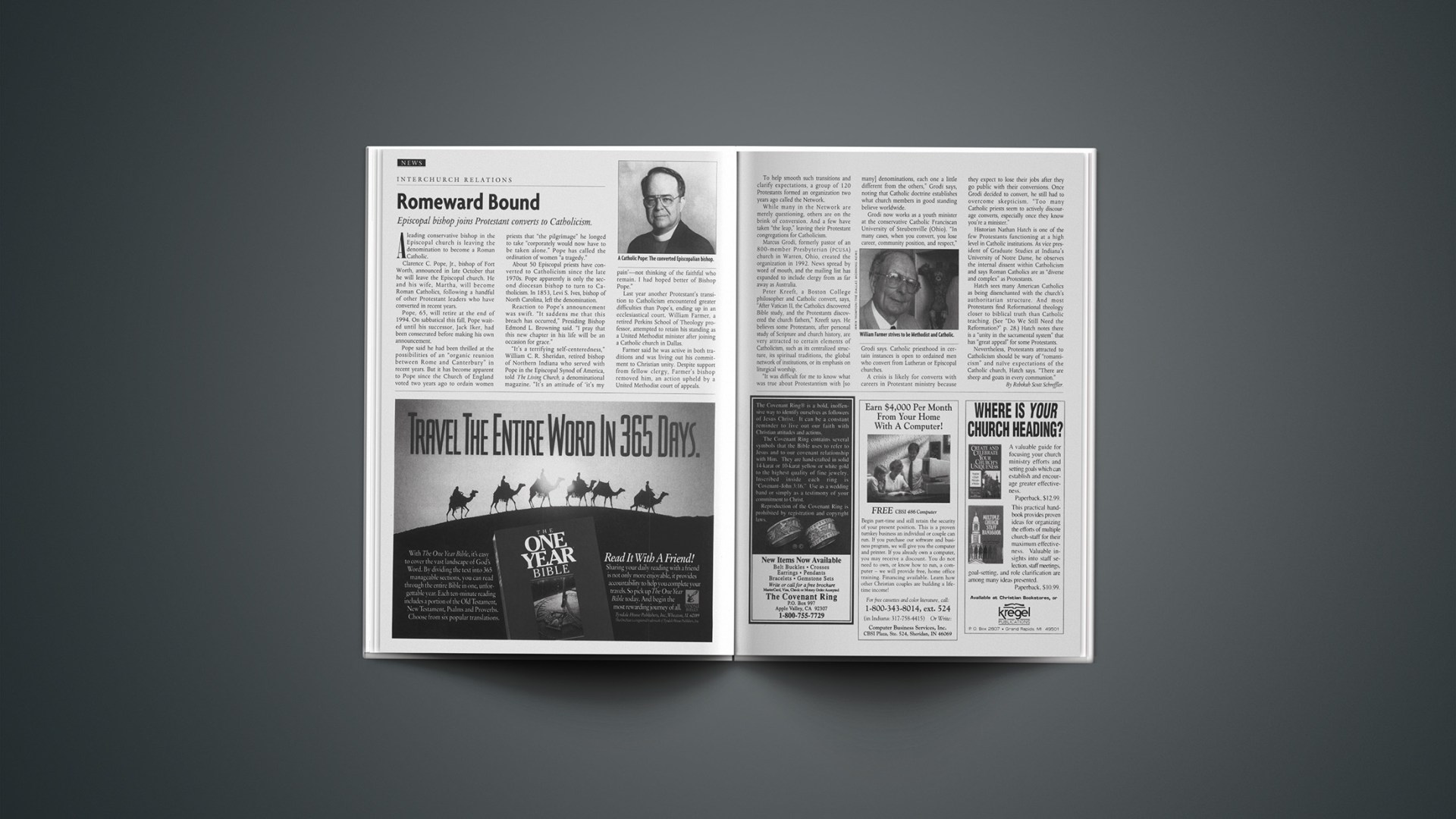Clarence C. Pope, Jr., bishop of Fort Worth, announced in late October that he will leave the Episcopal church. He and his wife, Martha, will become Roman Catholics, following a handful of other Protestant leaders who have converted in recent years.
Pope, 65, will retire at the end of 1994. On sabbatical this fall, Pope waited until his successor, Jack Iker, had been consecrated before making his own announcement.
Pope said he had been thrilled at the possibilities of an “organic reunion between Rome and Canterbury” in recent years. But it has become apparent to Pope since the Church of England voted two years ago to ordain women priests that “the pilgrimage” he longed to take “corporately would now have to be taken alone.” Pope has called the ordination of women “a tragedy.”
About 50 Episcopal priests have converted to Catholicism since the late 1970s. Pope apparently is only the second diocesan bishop to turn to Catholicism. In 1853, Levi S. Ives, bishop of North Carolina, left the denomination.
Reaction to Pope’s announcement was swift. “It saddens me that this breach has occurred,” Presiding Bishop Edmond L. Browning said. “I pray that this new chapter in his life will be an occasion for grace.”
“It’s a terrifying self-centeredness,” William C. R. Sheridan, retired bishop of Northern Indiana who served with Pope in the Episcopal Synod of America, told “The Living Church,” a denominational magazine. “It’s an attitude of ‘it’s my pain’ – not thinking of the faithful who remain. I had hoped better of Bishop Pope.”
Last year another Protestant’s transition to Catholicism encountered greater difficulties than Pope’s, ending up in an ecclesiastical court. William Farmer, a retired Perkins School of Theology professor, attempted to retain his standing as a United Methodist minister after joining a Catholic church in Dallas.
Farmer said he was active in both traditions and was living out his commitment to Christian unity. Despite support from fellow clergy, Farmer’s bishop removed him, an action upheld by a United Methodist court of appeals.
To help smooth such transitions and clarify expectations, a group of 120 Protestants formed an organization two years ago called the Network.
While many in the Network are merely questioning, others are on the brink of conversion. And a few have taken “the leap,” leaving their Protestant congregations for Catholicism.
Marcus Grodi, formerly pastor of an 800-member Presbyterian (PCUSA) church in Warren, Ohio, created the organization in 1992. News spread by word of mouth, and the mailing list has expanded to include clergy from as far away as Australia.
Peter Kreeft, a Boston College philosopher and Catholic convert, says, “After Vatican II, the Catholics discovered Bible study, and the Protestants discovered the church fathers,” Kreeft says. He believes some Protestants, after personal study of Scripture and church history, are very attracted to certain elements of Catholicism, such as its centralized structure, its spiritual traditions, the global network of institutions, or its emphasis on liturgical worship.
“It was difficult for me to know what was true about Protestantism with [so many] denominations, each one a little different from the others,” Grodi says, noting that Catholic doctrine establishes what church members in good standing believe worldwide.
Grodi now works as a youth minister at the conservative Catholic Franciscan University of Steubenville (Ohio). “In many cases, when you convert, you lose career, community position, and respect,” Grodi says. Catholic priesthood in certain instances is open to ordained men who convert from Lutheran or Episcopal churches.
A crisis is likely for converts with careers in Protestant ministry because they expect to lose their jobs after they go public with their conversions. Once Grodi decided to convert, he still had to overcome skepticism. “Too many Catholic priests seem to actively discourage converts, especially once they know you’re a minister.”
Historian Nathan Hatch is one of the few Protestants functioning at a high level in Catholic institutions. As vice president of Graduate Studies at Indiana’s University of Notre Dame, he observes the internal dissent within Catholicism and says Roman Catholics are as “diverse and complex” as Protestants.
Hatch sees many American Catholics as being disenchanted with the church’s authoritarian structure. And most Protestants find Reformational theology closer to biblical truth than Catholic teaching. (See “Do We Still Need the Reformation?”.) Hatch notes there is a “unity in the sacramental system” that has “great appeal” for some Protestants.
Nevertheless, Protestants attracted to Catholicism should be wary of “romanticism” and naive expectations of the Catholic church, Hatch says. “There are sheep and goats in every communion.”
Copyright © 1994 Christianity Today. Click for reprint information.










